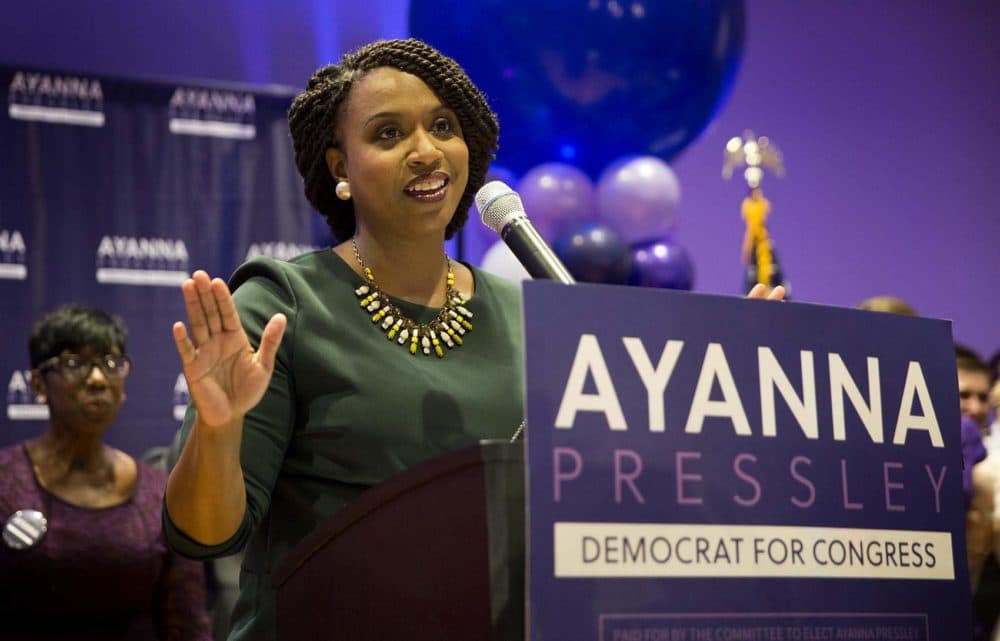Advertisement
'The District Has Changed': How Ayanna Pressley Won The 7th
Resume
"Wow, look at this room," Ayanna Pressley said to a diverse crowd of cheering Democratic supporters in Cambridge this past weekend. "This looks like the 7th Congressional District!"
That was more than just an applause line, because it explains a big part of how Pressley scored an upset victory last week over 10-term U.S. Rep. Michael Capuano.
"We built a movement," Pressley told WBUR on Monday. "This was a people-powered, broad, deep, diverse and grassroots coalition. ... We expanded the electorate. It's so critical that we [were] intentional about engaging new voices."
Pressley challenged the traditional notion of who votes in primary elections.
Conventional wisdom had her losing to a better-known, much-better-financed incumbent. That's what a lot of people took away from a WBUR poll, conducted in late July, that showed Capuano with a commanding 13-point lead. But Pressley clobbered him last week by 17 points. Does that mean the poll was wrong? Probably not. The poll was five weeks before the primaries, and it only reached "likely voters" — those who voted in past elections. So, if you're an incumbent like Capuano, you focus on those people, your supporters. And that's precisely what he did.
"He did everything right but win," said Mary Anne Marsh, a Boston-based Democratic political consultant. "Mike Capuano ran a textbook race, but people aren't looking for textbook this year."
Marsh said Pressley did the political equivalent of catching lightning in a bottle.
"So many candidates always say they're going to change the electorate — that they're going to broaden it, bring out people who don't vote, register people and all that, but they never do," she said. "But Ayanna Pressley's campaign did."
Social And Specialty Media
On average, about 50,000 people voted in each of the last three primary elections in the 7th district. Last week, more than 100,000 people came to the polls.
Alex Goldstein, a senior adviser for Pressley, said the campaign challenged assumptions about why some people stay home and don't vote.
"There are assumptions about millennials, and frankly about other parts of our community, that people don't vote because they're either lazy or apathetic and they don't care,” Goldstein said.
He argued people don't vote when they don't feel seen by the political process.
"One of the messages of our campaign was, 'We see you,' and I think that brought a lot of folks out," Goldstein said.
The Pressley campaign defied conventional ideas about how to get its message out. Badly outspent, Pressley could not afford to spend on TV ads like Capuano did, so she relied on free and social media. Among its efforts, the campaign produced a polished 90-second political ad and pushed it out over Twitter and Facebook. In the spot, Pressley is seen riding the No. 1 MBTA bus from Harvard Square to Dudley Square in Roxbury to highlight the economic disparity within the 7th district.
"I'll never grow complacent in tackling these inequities and disparities,” Pressley says in the ad, which went viral.
"The vast majority of our social media reception was actually organically viral," Goldstein said, "which means it was just people sharing what they wanted other people to see — whether it was on Facebook or Twitter."
The campaign also invested in ethnic and specialty media to reach Chinese-, Haitian- and Spanish-speaking communities in the district.
John Walsh, a former chairman of the state Democratic Party who managed Deval Patrick's successful gubernatorial campaign in 2006, said Pressley's campaign was truly grassroots. Among other things, that means it relied on excitement, new energy and word of mouth.
"A friend of mine ... [was] so excited about the race. He personally claims credit for 11 people who voted for her [because] he called them and talked about her,” Walsh said. “It's a qualitative difference when people are fired up — and that's what Ayanna had.”
A Call For Change
The election was a choice between a solid, experienced progressive and a challenger who agreed with most of his positions, but said it was time for change.
It made for a tough choice for voters like Marilyn Forman of Dorchester.
"I’ve known Capuano for so long, and I think he's always done really great work,” Forman said a few days before the election. “But I usually feel like it's time for change after a certain amount of years, but I'm just kind of on the fence."
In the end, voters like Foreman helped decide this race.
"I actually did vote for Ayanna,” Foreman said after the election. “Although I love Michael Capuano, [Pressley] is definitely the change we need to see in Congress."
Pressley's message of change resonated across the district. She dominated in Boston, and stunned Capuano by carrying Cambridge and almost tying him in his hometown of Somerville.
This election was all about change: change demanded by voters, and the change reflected by Boston itself.
“Look at the Boston City Council,” said Susan Tracy, a former Democratic state representative who runs the Strategy Group. “There are six women on that council, five of them women of color. That's not ‘old Boston,’ as they say. And I think that's a good thing."
Pressley's slogan, "Change Can't Wait," was a good one, according to Tracy.
“Clearly, the district has changed, and clearly it couldn't wait."
This segment aired on September 12, 2018.
